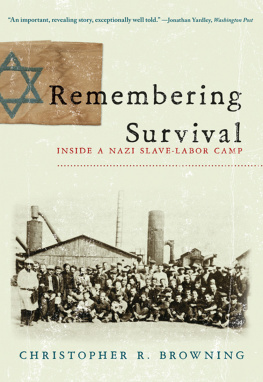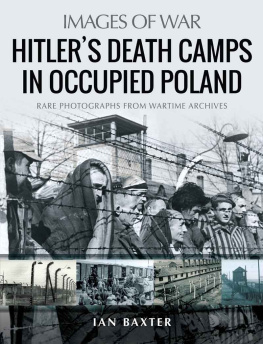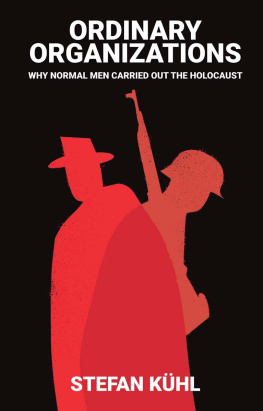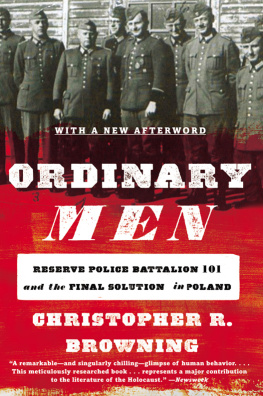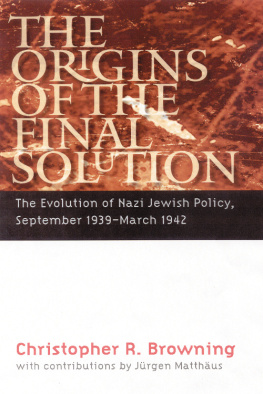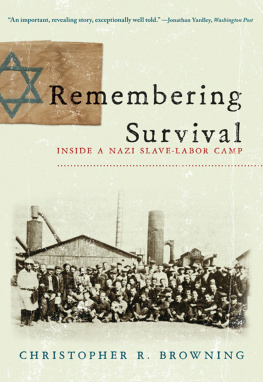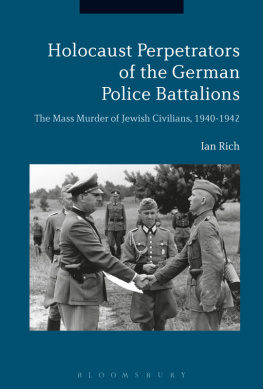for
Raul Hilberg
CONTENTS
Guide
Maps
In mid-March 1942 some 75 to 80 percent of all victims of the Holocaust were still alive, while 20 to 25 percent had perished. A mere eleven months later, in mid-February 1943, the percentages were exactly the reverse. At the core of the Holocaust was a short, intense wave of mass murder. The center of gravity of this mass murder was Poland, where in March 1942, despite two and a half years of terrible hardship, deprivation, and persecution, every major Jewish community was still intact, and where eleven months later only the remnants of Polish Jewry survived in a few rump ghettos and labor camps. In short, the German attack on the Jews of Poland was not a gradual or incremental program stretched over a long period of time, but a veritable blitzkrieg, a massive offensive requiring the mobilization of large numbers of shock troops. This offensive, moreover, came just when the German war effort in Russia hung in the balancea time period that opened with the renewed German thrust toward the Crimea and the Caucasus and closed with the disastrous defeat at Stalingrad.
If the German military offensive of 1942 was ultimately a failure, the blitzkrieg against the Jews, especially in Poland, was not. We have long known how the Jews in the major ghettos, especially Warsaw and Ld, were murdered. But most Polish Jews lived in smaller cities and towns whose populations were often more than 30 percent Jewish, and in some cases even 80 or 90 percent. How had the Germans organized and carried out the destruction of this widespread Jewish population? And where had they found the manpower during this pivotal year of the war for such an astounding logistical achievement in mass murder? The personnel of the death camps was quite minimal. But the manpower needed to clear the smaller ghettosto round up and either deport or shoot the bulk of Polish Jewrywas not.
My search for the answers to these questions led me to the town of Ludwigsburg near Stuttgart. Here is located the Central Agency for the State Administrations of Justice (Zentrale Stelle der Landesjustizverwaltungen), the Federal Republic of Germanys office for coordinating the investigation of Nazi crimes. I was working through their extensive collection of indictments and judgments for virtually every German trial of Nazi crimes committed against the Jews of Poland when I first encountered the indictment concerning Reserve Police Battalion 101, a unit of the German Order Police.
Though I had been studying archival documents and court records of the Holocaust for nearly twenty years, the impact this indictment had upon me was singularly powerful and disturbing. Never before had I encountered the issue of choice so dramatically framed by the course of events and so openly discussed by at least some of the perpetrators. Never before had I seen the monstrous deeds of the Holocaust so starkly juxtaposed with the human faces of the killers.
It was immediately clear from the indictment, which contained quite extensive verbatim quotations from pretrial interrogations of battalion members, that the case was based upon an unusually rich collection of testimonies. Moreover, many of these testimonies had a feel of candor and frankness conspicuously absent from the exculpatory, alibi-laden, and mendacious testimony so often encountered in such court records. The investigation and legal prosecution of Reserve Police Battalion 101 had been a decade-long process (1962 to 1972) conducted by the Office of the State Prosecutor (Staatsanwaltschaft) in Hamburg. This officesurely one of the most diligent and committed prosecutors of Nazi crimes in all of the Federal Republicstill had custody of the court records relating to the case, and I successfully applied for permission to see them.
Unlike so many of the Nazi killing units, whose membership can only be partially reconstructed, Reserve Police Battalion 101s roster was available to the investigators. As most of the men came from Hamburg and many still lived there at the time of the investigation, I was able to study the interrogations of 210 men from a unit consisting of slightly less than 500 when it was sent at full strength to Poland in June 1942. This collection of interrogations provided a representative sample for statistical answers to questions about age, Party and SS membership, and social background. Moreover, about 125 of the testimonies were sufficiently substantive to permit both detailed narrative reconstruction and analysis of the internal dynamics of this killing unit.
Ultimately, the Holocaust took place because at the most basic level individual human beings killed other human beings in large numbers over an extended period of time. The grass-roots perpetrators became professional killers. The historian encounters numerous difficulties in trying to write about a unit of such men, among them the problem of sources. In the case of Reserve Police Battalion 101, in contrast to many of the killing units operating in the Soviet Union, there are few contemporary documents and none that deal explicitly with its killing activities. The accounts of a handful of Jewish survivors can establish the dates and magnitude of various actions in some of the towns where the battalion operated. But unlike survivor testimony about prominent perpetrators in the ghettos and camps, where prolonged contact was possible, survivor testimony can tell us little about an itinerant unit like Reserve Police Battalion 101. Unknown men arrived, carried out their murderous task, and left. Seldom, in fact, can the survivors even remember the peculiar green uniforms of the Order Police to identify what kind of unit was involved.
In writing about Reserve Police Battalion 101, therefore, I have depended heavily upon the judicial interrogations of some 125 men conducted in the 1960s. To read about the same events experienced by a single unit as filtered through the memories of 125 different men more than twenty years after the fact is disconcerting to a historian looking for certainties. Each of these men played a different role. He saw and did different things. Each subsequently repressed or forgot certain aspects of the battalions experiences, or reshaped his memory of them in a different way. Thus the interrogations inevitably present a confusing array of perspectives and memories. Paradoxically, I would have had the illusion of being more certain about what happened to the battalion with one detailed recollection instead of 125.
Beyond the differing perspectives and memories, there is also the interference caused by the circumstances in which the testimony was given. Quite simply, some men deliberately lied, for they feared the judicial consequences of telling the truth as they remembered it. Not only repression and distortion but conscious mendacity shaped the accounts of the witnesses. Furthermore, the interrogators asked questions pertinent to their task of collecting evidence for specific, indictable crimes committed by particular people, but did not systematically investigate the broader, often more impressionistic and subjective facets of the policemens experience that are important to the historian, if not to the lawyer.
As with any use of multiple sources, the many accounts and perspectives had to be sifted and weighed. The reliability of each witness had to be assessed. Much of the testimony had to be partially or totally dismissed in favor of conflicting testimony that was accepted. Many of these judgments were both straightforward and obvious, but others were quite difficult. And as self-conscious as I have tried to be, at times I undoubtedly made purely instinctive judgments without even being aware of it. Other historians looking at the same materials would retell these events in somewhat different ways.


